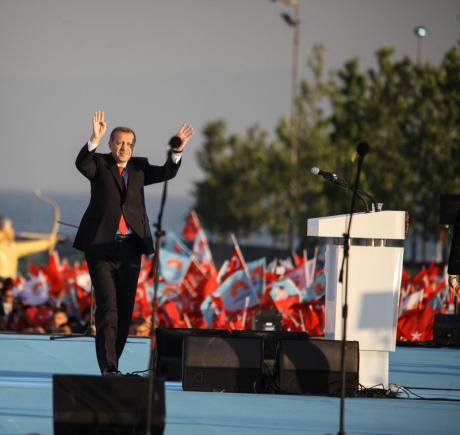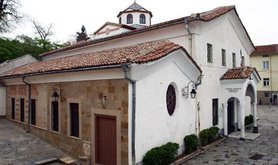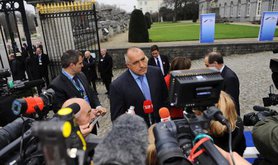
Erdogan at huge AKP election rally, Istanbul, May 30,2015. Demotix/Avni Kantan. All rights reserved.
Turkey’s parliamentary elections, held on 7 June, contain a paradox. These are doubtless very important polls that will, in all likelihood, seal the country’s fate for the next decade at least. Yet for all the high stakes involved, and the suspense of this eve-of-poll moment, we sort of know who will win.
Here’s a brief sketch of what to expect. The governing Justice & Development Party (AKP) will surely come out on top - as it has done in seven elections in row, most recently the municipal and presidential polls in 2014 (and that's not to count the 2007 and 2010 referendums). The Republican People’s Party (CHP) will be the runner-up, garnering at least one-quarter of the vote. The Nationalist Action Party (MHP) will finish third with a bit over 15-17% (the party is now on the rise; long gone are the days when the party was barely capable of passing the threshold to qualify for seats in parliament, now set at 10%).
Moreover, the AKP will perform strongly across Turkey, not just its native Anatolian heartland. By contrast, all other parties’ votes will be concentrated in a handful of territorial clusters: e.g. the Aegean littoral and Thrace (Trakya) in the case of the CHP, Adana and Osmaniye for the MHP. In other words, the AKP’s dominance over the Turkish party political scene is here to stay.
But there is a catch: will the governing party remain as strong in the parliament to come? The pro-Kurdish Peoples’ Democratic Party (HDP) holds the answer. If the HDP makes it past the 10% threshold the party will effectively deny the AKP the decisive majority in the Ankara parliament (the Grand National Assembly) needed to change the constitution - namely 330 seats, three-fifths or the total of 550. If the HDP fails to reach 10%, the resulting distribution of votes will likely enable Turkey's president, Recep Tayyip Erdoğan, to fulfil his longstanding ambition: inaugurating a presidential regime of centralised power by unilaterally redrawing the basic law and gaining endorsement via another referendum (the available scenarios are here). This was already a desired option in 2011, but the AKP came short of the coveted 330 target in that year's election and the opposition was able to block its effort to produce a new constitution.
The HDP wager
So will the HDP make it through? Its leadership, in the shape of the charismatic Selahattin Demirtaş, has taken a serious gamble by running candidates on a single party slate, rather than as individuals as in past elections. Polling surveys give them a fair chance but, as noted by fellow Turkey analyst Aaron Stein, these do not disclose the margin of error. To boost its numbers, the HDP - still widely seen as the legal wing of the outlawed Kurdistan Workers’ Party (PKK) - hopes to tap into two constituencies. The first is conservative voters in the majority Kurdish southeast of Turkey who are disenchanted with the AKP. Although sympathetic to Erdoğan’s rhetoric of Muslim unity and solidarity, many in this group also favour recognition of Kurdish cultural and linguistic rights and, possibly devolution.
The second constituency is left-liberal Turks in the country’s urban west. These are the target of the HDP's attempt to rebrand itself from an advocate of Kurdish rights to a bona fide all-Turkey party catering for the centre-left (something reflected in the party's campaign slogan, “Great Humanity” [Büyük İnsanlık], a reference to the legendary leftist poet Nazım Hikmet). This shift would entail squeezing votes from the CHP, especially amongst younger and more open-minded Turks who see that Kemalist outfit as too rigid and marred by exclusionary nationalism, but also (or alternatively) other parties on the liberal and radical fringe.
If Demirtaş’s bet does pay off, the impact will be huge. Even then, the AKP will most likely have a majority (276 seats at a minimum), though the party won’t be in a position overhaul the constitution without the Kurds' support. But if the HDP has no representation in parliament, that too will spell trouble. It will prompt Kurdish nationalists to question the legitimacy of Turkey’s legislature and put under intense strain the so-called “resolution process” (that is, the peace talks between the AKP government and the PKK, which have been ongoing since 2013). It is clear that if violence makes a comeback, everyone stands to lose.
The AKP fear
The AKP has a lot going for it. After nearly thirteen years in power it has a firm grip on all levers of the state; its candidates get the lion’s share of media coverage; President Erdoğan, a formidable electioneering force, has already overstepped constitutional limits to spearhead the campaign. It is realistic to envisage the party repeating its success in the March 2014 local elections, when it obtained 43% of the votes.
But there are also downsides. Erdoğan is a also divisive figure; many of his opponents might well cast a ballot for the HDP however much they resent Kurdish separatism (the MHP benefited a lot from such tactical votes in 2011); and the AKP itself may haemorrhage support because of Turkey’s economic slowdown (the country's GDP expanded by a mere 3% in 2014, compared to around 9% in the boom years of 2010-11 at the time of the last general elections).
If the AKP does spectacularly fail, it might cost the prime minister, Ahmet Davutoğlu, his job. He may be forced by Erdoğan to step down and give way to a figure loyal to the president. In addition, losing ground to its competitors would face the AKP - in the future, if not immediately - of governing in coalition. That would be a return to pre-2002 Turkey. Both the MHP and HDP can surely serve as junior partners one day, though that day is not as near at it may seem to some.
The Erdoğan factor
But process matters as much as outcome. What is at stake in Turkey is the quality of elections as a democratic institution. Turkey has held sixteen general elections since 1950 with multiple parties competing, and has overall a good track record. On seven occasions, the opposition has come to power as a result of the vote. Freedom House, which ranks Turkey as “partly free”, gives it an impressive eleven of a maximum twelve points on electoral process, and the watchdog judged the 2011 polls as free and fair.
So if the AKP does use its incumbency advantage to rig the results in order to push the HDP under the threshold and redistribute its votes, that will gravely compromise the integrity of Turkey's institutions. Turkey might then be sliding back into its old illiberal self - with damage to media freedom, civil society or the rule of law - even as it continues to meet the criteria for an electoral, if unconsolidated, democracy. The disputed re-election of metropolitan Ankara’s long-standing mayor Melih Gökçek in March 2014 has already cast a shadow of doubt. Erdoğan, who is fond of legitimising his paternalistic rule with references to the “national will” as expressed through the ballot-box, has a big responsibility: if he does not play by the rules, the damage will start with alienating the HDP and soon lead to an undermining of Turkey’s political achievements as a whole.
The focus on the president is apt. For in the final analysis these elections are less about the next parliament or even the AKP than about Erdoğan’s political future. By stepping into the campaign, the president has sought to turn the contest from a battle of political programmes carried out in the framework of a system of proportional representation into a plebiscite on his leadership with a strong majoritarian flavour.
It all boils down to a choice: does Turkey want a two-pronged executive with a directly elected president sharing power with a council of ministers (the status quo), or Erdoğan’s vision of a presidential republic in his image - the widely discussed “New Turkey”? In turn, this raises the question of what the president’s success or failure will mean for his party. To be fair, it is unrealistic to expect any positive change in Turkey unless there is momentum from within AKP.
I will be back with more - after 7 June!
Read more
Get our weekly email



Comments
We encourage anyone to comment, please consult the oD commenting guidelines if you have any questions.